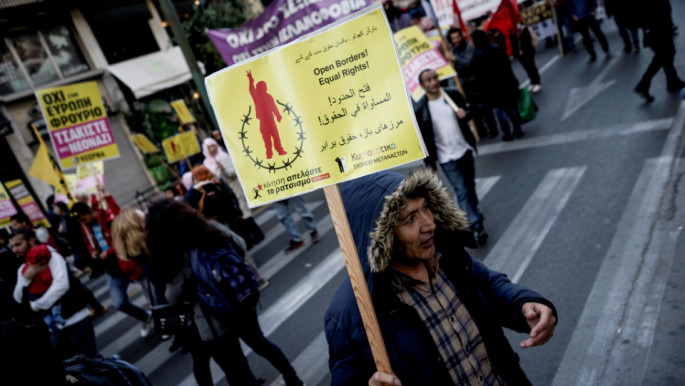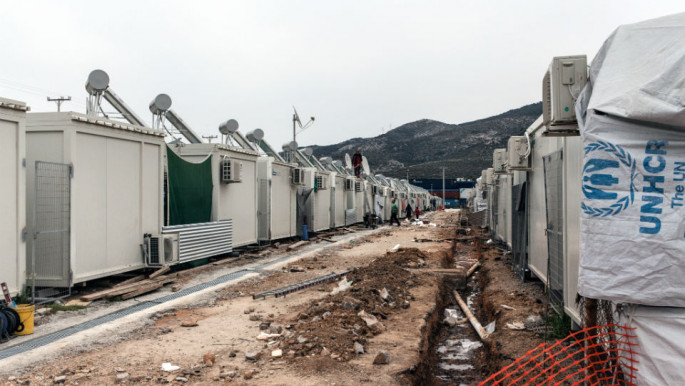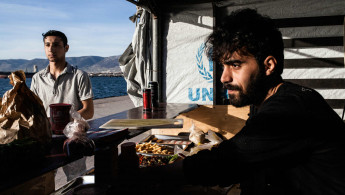Abandoned refugees will eventually leave Greece, legally or illegally
According to official sources, 62,156 refugees are at the moment living in Greece, with 14,268 accommodated in official facilities on the Aegean islands, prohibited from travelling to the mainland until their asylum applications are processed.
These refugees have been stranded since March 2016, in formal and makeshift camps around the country.
On the first anniversary of the EU-Turkey refugee deal in March, thousands of refugees, along with their supporters, gathered in central Athens.
"We are humans. We demand our rights," they shouted in the streets of the Greek capital. "Open the borders."
Refugees from Syria and Iraq told The New Arab they were waiting for relocation and family reunification to European Union countries, while others coming from Pakistan, Iran or Afghanistan are considering more risky ways to find refuge.
"If borders continue to stay closed, we will have to leave the country illegally, using smugglers," said 30-year-old Kashar, from Pakistan.
Tents are for camping
Greece received £268 million ($344m) through the UN's 2016 Inter-Agency Appeal, however living conditions in formal camps initially designed for short-term use remain devastating, aid agencies report.
Refugees around Greece continue to live in summer tents in former army bases, abandoned warehouses or container settlements.
"For over a year I have been staying in Elliniko camp," said Masood from Afghanistan, sitting in the green summer tent which he calls home.
"For six months I used to sleep outside on the parking area of this camp."
There are around 1,300 refugees, mainly Afghans and Iranians, staying at the makeshift Elliniko camp, south of Athens. Authorities here are using abandoned olympic facilities and a former airport to host them.
Families build walls with bedsheets, but all are sleeping in tents. The smell of freshly cooked chicken wafts in from the affluent suburb nearby, and there is constant noise.
 |
It's like a cup of tea without tea |  |
"Please, try the food we are being served here. It's tasteless. No salt, no spices! After one year you just get sick and tired of it," complains Masood.
"Yes, we have a doctor but he doesn't give medicine," he says. "It's like a cup of tea without tea."
Masood says he used to have a decent life in Kabul. He worked for the United Nations Assistant Mission in Afganistan (UNAMA), and later for the International Security Assistance Force (ISAF). He shows his recommendation letters and hopes they could help him during the asylum seeking procedure.
"I would never leave Afghanistan, unless it was my only option. My country is my paradise," explains Masood. A broad smile crosses his face as he remembers life in Kabul.
| Article continues below |
 |
| Refugees and their supporters took to the streets of Athens to protest against their conditions [Kostis Ntantamis] In pictures: Click here for Kostis Ntantamis' full photoblog from Elliniko and Skaramagas |
Life goes on
Most refugees in Elliniko camp try to maintain a routine. Makeshift mosques allow them their daily prayer. Children attend classes in a school organised in camp. Families visit the beach area, wash their clothes or care for their modest accomodations.
"Just a month ago we were living without hot water and heating, but after a massive hunger strike, things changed and even the minister for migration, [Ioannis] Mouzalas visited us," recalls Masood.
During his visit, the migration minister sent a very clear message to refugees: "If someone doesn't like it here, they can leave."
Refugees in Elliniko camp believe they have no other option.
"I will go to Patras port and leave from there," says 22-year-old Alyas in perfect English. "[It is] illegal, of course, but what other options do I have?" His documents expired a month ago.
"I am afraid of being caught and probably detained. I have never been in jail, and Greek police are not something you want to deal with." He reads an Agatha Christie novel and try to make himself busy with occasional English teaching.
"In Greece, they treat animals better than us."
Two refugee worlds
Meanwhile, the situation is completely different in Skaramagas camp, a port town west of the Athens.
Here live 3,200 refugees, mainly from Syria and Iraq, staying in white shipping containers marked with blue and red numbers. The spring breeze and seaside smell pass through the container settlement.
"Welcome, welcome to my house," says 52-year-old Nader, greeting us at the entrance of his container. As a child he used to live in Germany with his uncles. "I forgot a lot of my German, as this was 38 years ago, but during the next months I will have to relearn again."
Most of his close family members are already in Essen and Düsseldorf.
Nader's wife, son and daughter share a two-room container with the family of his brother. All together, eight people are living here. The family of Syrian Kurds are trying to keep their house clean and well-equipped.
"I bought a satellite dish together with a TV at a flea market for 65 euros. We want to watch Syrian programs," smiles the former owner of a small shop in Aleppo. His only daughter, 10-year-old Nadia, sings along to an Arab soap opera being played on the TV.
Half of the residents in Skaramagas camp are children. Refugee children have an option either to visit public schools or a volunteer-run school in the camp.
Nadia is going to neither, and doesn't know how to read or write.
"When we arrive in Germany this will change," her father says. "Then she will go to school."
| Article continues below |
 |
| Refugees in Skaramagas camp live eight to a single container [Kostis Ntantamis] In pictures: Click here for Kostis Ntantamis' full photoblog from Elliniko and Skaramagas |
Psychological pressure
The view from the Kurdish family's container may seem rosy, and they are grateful for the accomodation. But they recall camps in which they used to live: "Snakes were passing through the tents!"
"We are sitting here, doing nothing. Slowly we are all going mad. I am sick and my wife also," says Nader. "We miss Syria. We miss Aleppo."
Psychologists from Medecins Sans Frontieres, the international medical organisation, are witnessing an increase in suicide attempts and cases of physical self-harm at refugee camps in Greece.
With tears in his eyes, Nader remembers his life in Aleppo: "Bombs every day, constant fear and terror. I don't want to talk about it," he shakes his head. He shows a photo of ruins. "This used to be our house," he says.
Refugees waiting
Most refugees in Skaramagas camp are waiting for family reunification or relocation to other European countries. Untill then they try to make themselves busy. Some refugees open small restaurants, barbers or snack shops - in which Arabic music is played all day long.
"Just a few more months and I will join my wife in Germany," 27-year-old Mustafa tells us. He is preparing falafel and other local dishes. Two of his friends are helping him in his makeshift shop.
"I can't really complain. Only the food is not good, so most of us cook at home," explains 46-year-old lawyer Ahmed from Damascus.
It's early evening. A seagull flies overhead as Syrian refugees fish in the waters of Skaramagas port. They just caught a big fish and the company of men is satisfied: "We will eat it for dinner!"
Skaramagas camp remains the most desired camp in the Attica region, with no vacancies at any point in the year. Elliniko camp, meanwhile, has capacity for 4,100 people, yet only has 1,300 inhabitants.
The huge gap between living conditions remains a feature among the variety of refugee camps across Greece. But all refugees in Greece who have fled the horrors of war have one common goal: to leave an economically devastated Mediterranean country as soon as possible.
Katja Lihtenvalner is a freelance journalist and researcher based in Athens. Follow her on Twitter: @Lihtenvalner
Click here for Kostis Ntantamis' full photoblog from Elliniko and Skaramagas


![Minnesota Tim Walz is working to court Muslim voters. [Getty]](/sites/default/files/styles/image_684x385/public/2169747529.jpeg?h=a5f2f23a&itok=b63Wif2V)






